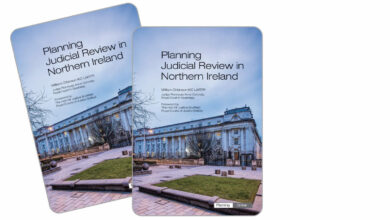Planning and legal risk: Prevention is better than cure

Andrew Ryan, planning and environment partner at TLT says that councils, as planning authorities, can help foster learning and best practice through a proactive approach to legal risks.
April 2025 marks a decade since planning powers were transferred to local councils in Northern Ireland. Allowing planning decisions to be made locally by elected representatives is generally positive, but the system has its flaws, particularly through delays and inefficiencies impacting timely decision-making.
A significant contributor to delay in the planning process is the threat of judicial review (JR). A legal challenge, whether successful or not, can extend final decision times by months, if not years. Northern Ireland has a disproportionately high rate of litigation, and the frequency of planning challenges is rising, partly due to the emergence of experienced self-litigants and the availability of statutory cost caps, which make such proceedings more accessible. The situation is perhaps worse than many think – JR applications often do not progress to a published judgment because planning authorities quietly concede at an early stage upon identifying flaws.
While legal challenges are an accepted part of the planning landscape, councils can take steps to mitigate their impact. A JR is not a re-examination or appeal of the original application; rather, it must identify a legal flaw in the process—such as a misinterpretation of policy or failure to adhere to legislative requirements.
Many JR grounds are often thinly disguised merit-based challenges questioning professional judgment. The courts are becoming less tolerant of such challenges, particularly where they become ‘battles of experts’, typically dismissing them unless such decisions are deemed ‘irrational’, which is a rare occurrence. Councils are also becoming more willing to resist ‘merits’ cases which can deter a potential litigant at an early stage.
Successful challenges usually revolve around two main issues: failure to follow legislation and procedure, or misapplication of planning policy. For the former, environmental assessments in particular present a risk for potential challenges. The introduction of new local development plans could increase instances of alleged policy misapplication, and ultimately it will be for the courts to interpret the new wording.
To address these challenges, planning authorities must ensure they receive clear legal advice early in the process, particularly where an application is proving controversial and generating many objections. A significant part of a planning solicitor’s role is to provide this legal and procedural guidance. Often this is developer side, but councils also have access to legal expertise, and utilising it proactively can ultimately be cost-effective.
Resolving legal risks early might head off a challenge (such as in the aforementioned ‘merits’ cases) or at least minimise chances of success. This proactive approach helps foster learning and best practice within councils, ultimately enhancing long-term decision-making.
While no amount of legal advice can entirely eliminate the risk of judicial review, obtaining sound legal counsel before making decisions is essential, especially as pressures on councils increase to deliver robust planning decisions in a reasonable timescale.

T: 0333 006 0967
E: Andrew.Ryan@tlt.com
W: www.tlt.com





